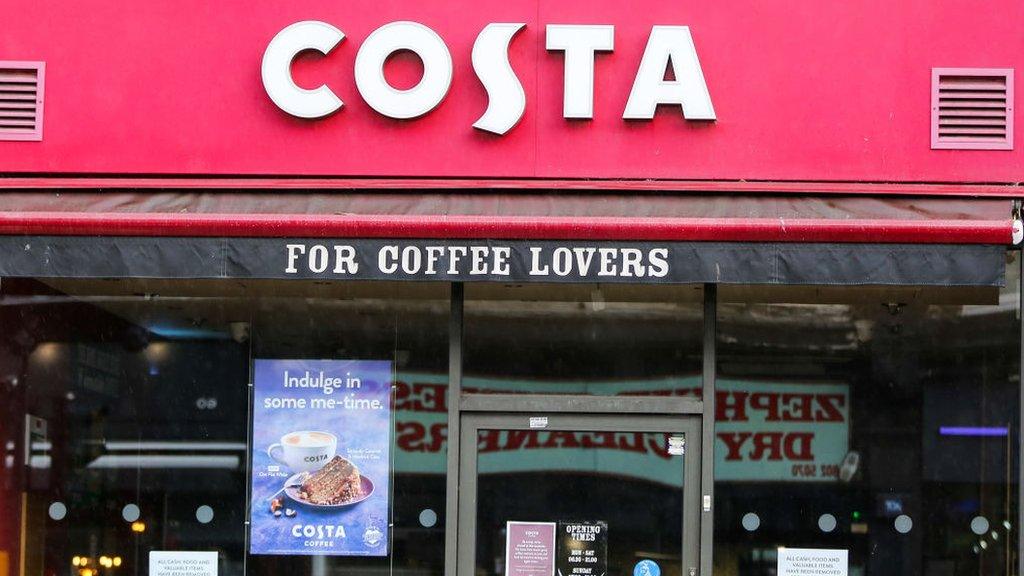The coffee start-ups brewing up a storm in lockdown
- Published
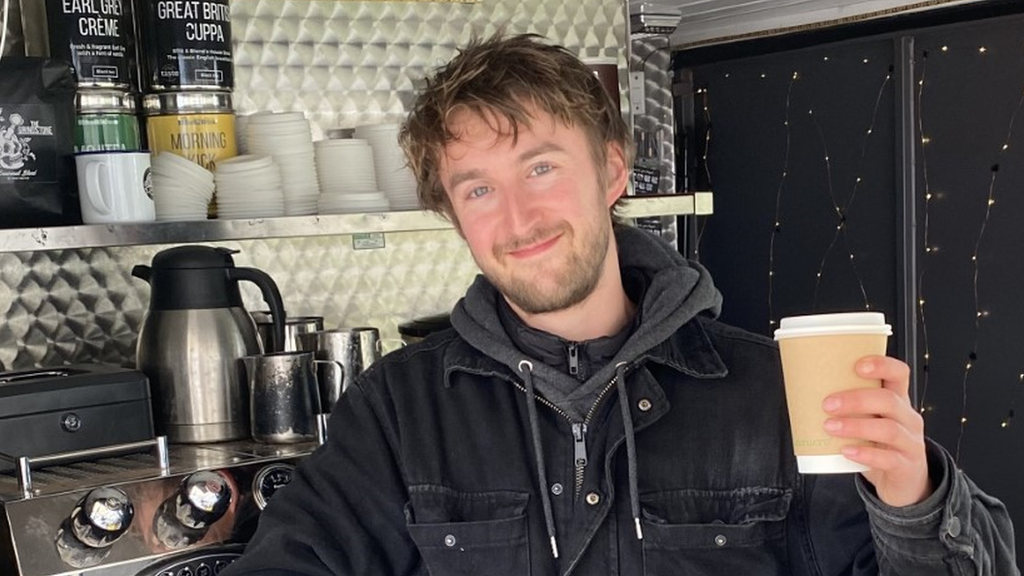
James King set up his coffee van in March last year
Before the pandemic struck we Brits would spend around £5bn a year in High Street coffee shop chains, but their sales have plummeted over the course of three lockdowns. Nevertheless our desire for caffeine remains and some small, independent companies have grabbed the opportunity to squeeze into the gap in the market.
If the likes of Caffé Nero, Costa and Starbucks have suffered in lockdown, then the humble coffee van has come into its own.
With no indoor seating, they could continue to serve customers outdoors - and of course quickly relocate to find them.
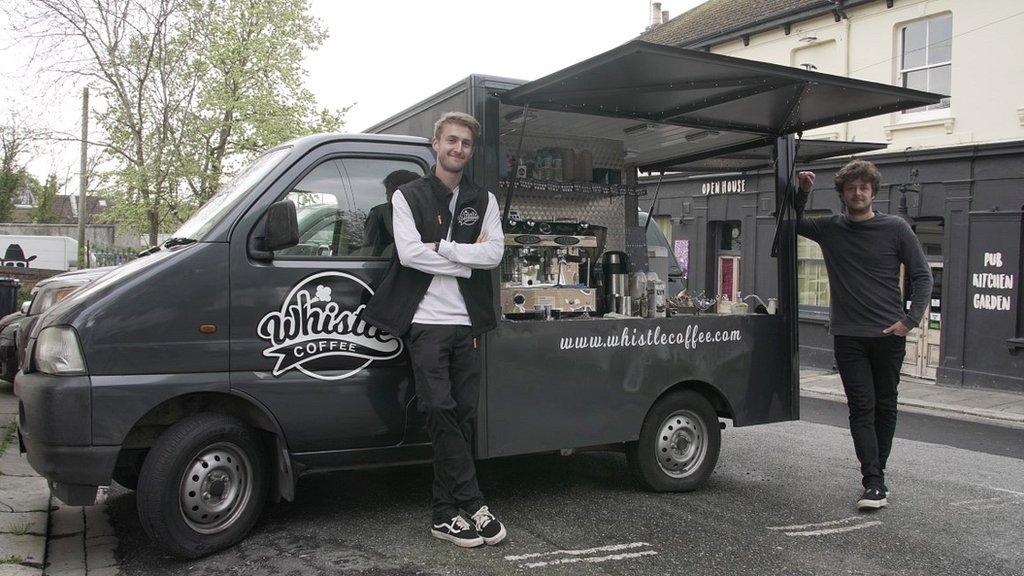
James and his brother originally chose a pitch near a rail station
James King, 28, used to work as a barista for a coffee chain in Brighton, but on 1 March 2020 he took the plunge of quitting to run his first coffee van. Not great timing - or so he thought at first.
The small, regular clientele he'd found outside his local train station quickly dwindled after the first lockdown. He wasn't eligible for any government financial support because he was a newly registered business.
Rather than pack it in, he decided to take his Whistle Coffee van on a tour of the community hospitals in Brighton, offering free hot drinks to NHS workers. He originally subsidised this with a GoFundMe crowdfunding campaign, but soon suppliers donated stock for free.
His fledgling business managed to weather 2020 and in gratitude the NHS offered him a regular pitch at Brighton General Hospital.
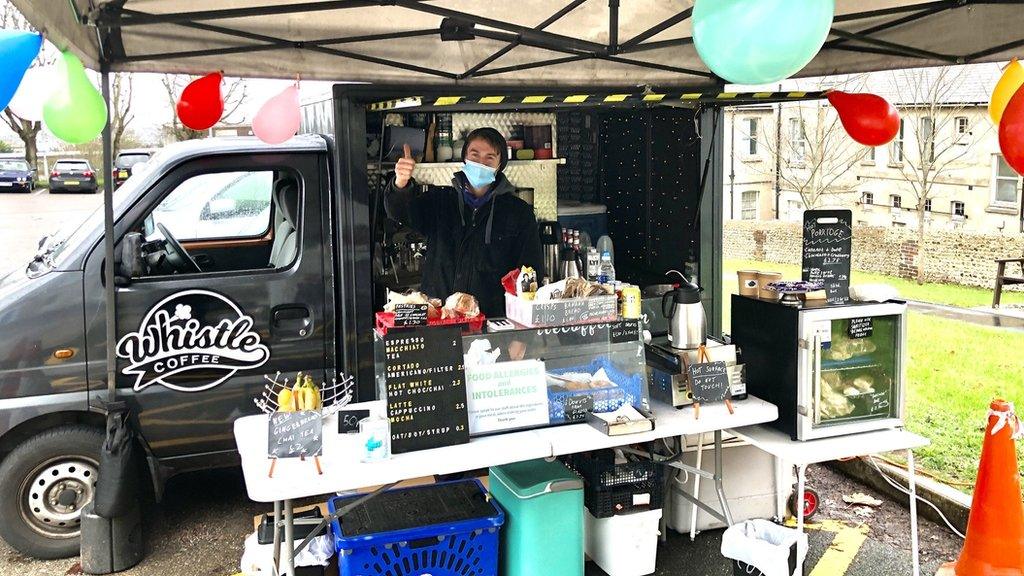
James at his permanent spot outside Brighton General Hospital
James now has plans to expand with a second van.
"I think [lockdown] has given business owners like myself an incredible boost," he says.
"Cafes have had to adapt to only serving takeaway drinks, but it is what our businesses are built on - vans are more flexible, we come to you."
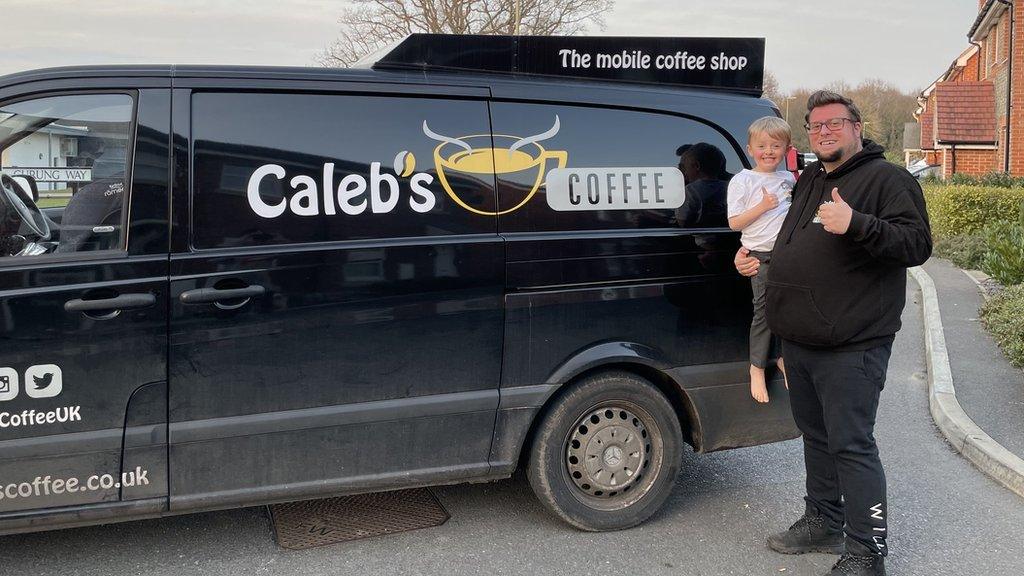
Matt Vaughan started his mobile coffee business in lockdown
Other entrepreneurs also spotted this opportunity in lockdown and started mobile coffee businesses for the first time.
Former radio presenter Matt Vaughan, 39, from Fleet in Hampshire, opened his business in August 2020 and wasn't afraid to experiment.
He set up Caleb's Coffee, named after his son, and drove to customers' houses to make and deliver fresh coffee on site.
But it wasn't cost-effective, and he soon stopped the on-demand service.
"Realistically I could only serve five to six houses per hour due to the time it takes to drive there and make the drink," says Matt. "I still do the odd trip for birthday parties though."
His van now migrates between two fixed sites, with a steady stream of joggers and home workers, and is doing well.
"There's no business rates to pay with vans - though there is licenses [you need] - but it's still a cost saver," says Matt.
He tries to stand out by specialising in cakes and hot chocolates as well as sweet-toothed coffee creations like Turkish Delight lattes.
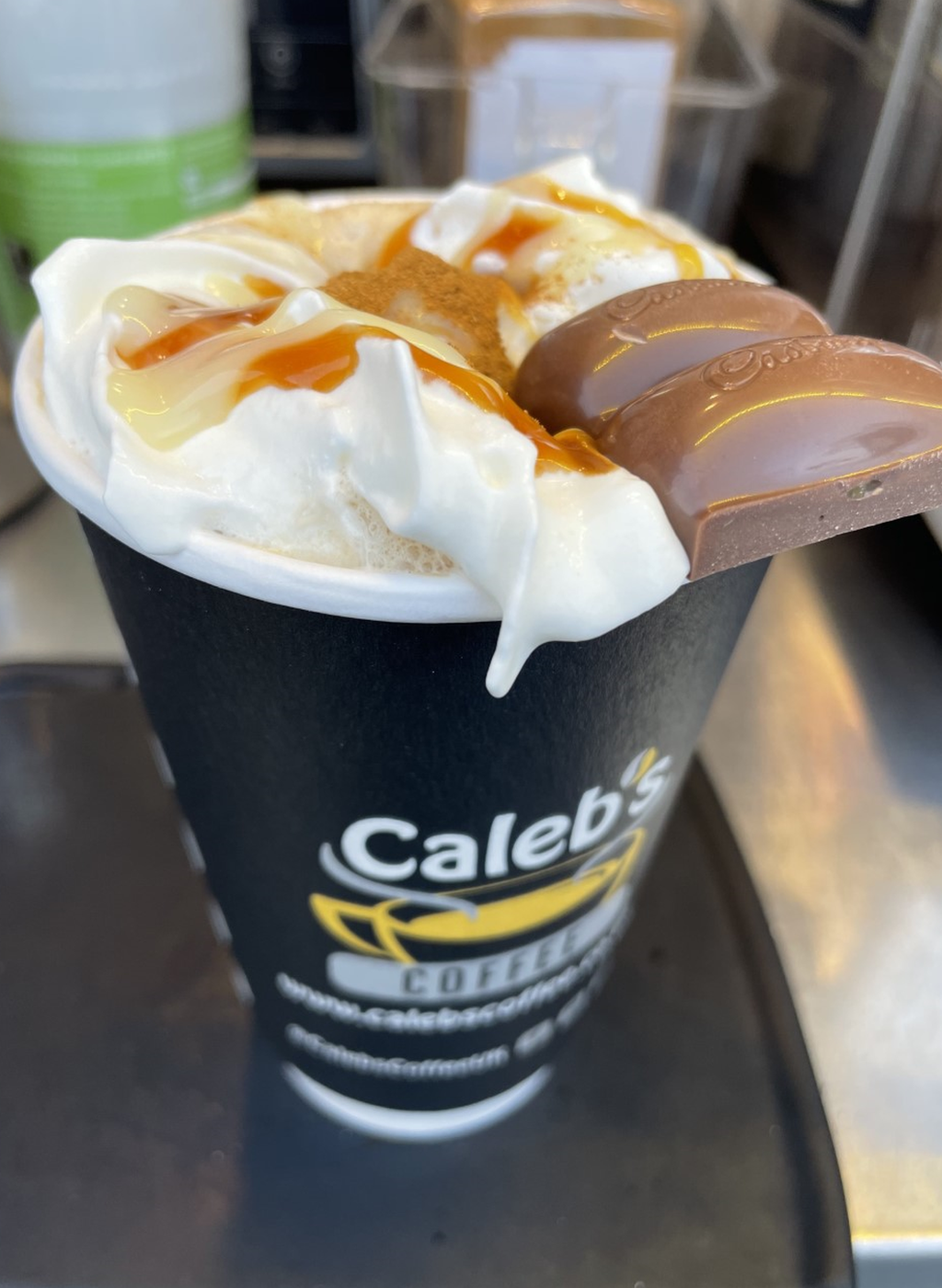
One of Matt's luxury caramel white hot chocolates

The big coffee shop chains have seen sales fall for the first time in 20 years, dropping nearly 40% since the first lockdown in March 2020, according to figures from coffee analyst firm Allegra.
The UK's coffee habit sees us drink around 30 billion cups a year, according to another report, Nescafe's 2020 Factfile, external. But most of these aren't bought in shops. People buy their own coffee and prepare it themselves at home - the majority of which is instant coffee bought in supermarkets.
Online ordering of food and drink soared during lockdown and coffee was well-placed to benefit from this trend, since it can be easily posted.
It also turned out that a new army of at-home workers wanted to be their own baristas, percolating and plunging in the comfort of their kitchens.
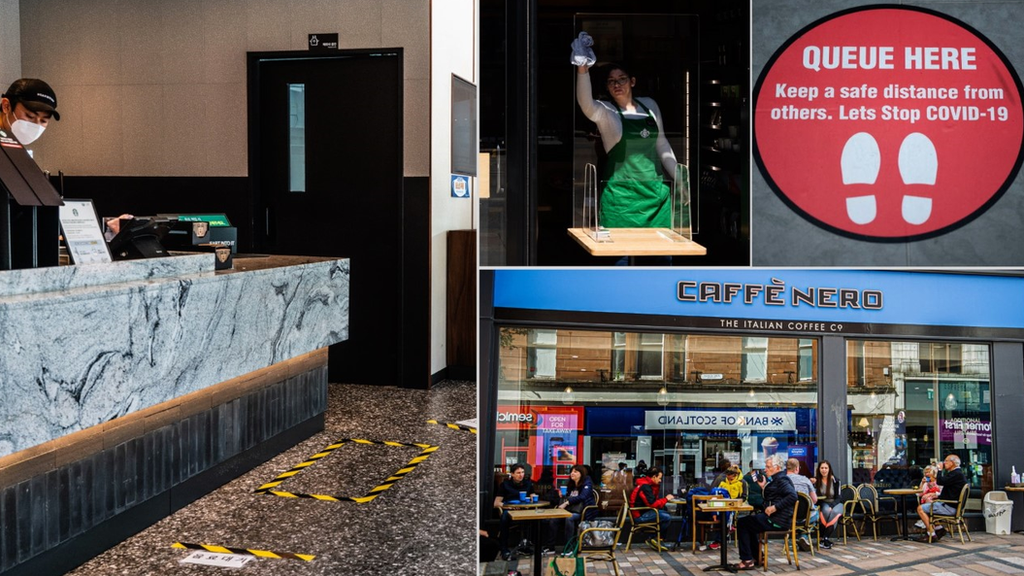
Chains and other shops have had to adapt to changing lockdown and social distancing measures
Retailers reported coffee sales rising by 74% in the week before the first lockdown - which was widely expected to happen - was finally announced.
But it wasn't just supermarkets and big brands benefiting from this surge.
Specialist coffee businesses offering subscription services saw significant growth during the Covid era.
For example, Dog and Hat Coffee, founded in York in 2017, offers four different selections from UK roasters each month. It had only 100 subscribers before the pandemic.
"We've now got nearly 1,000," says co-founder Su Morgan. "It's been a rollercoaster year. We absolutely took off because of lockdown."
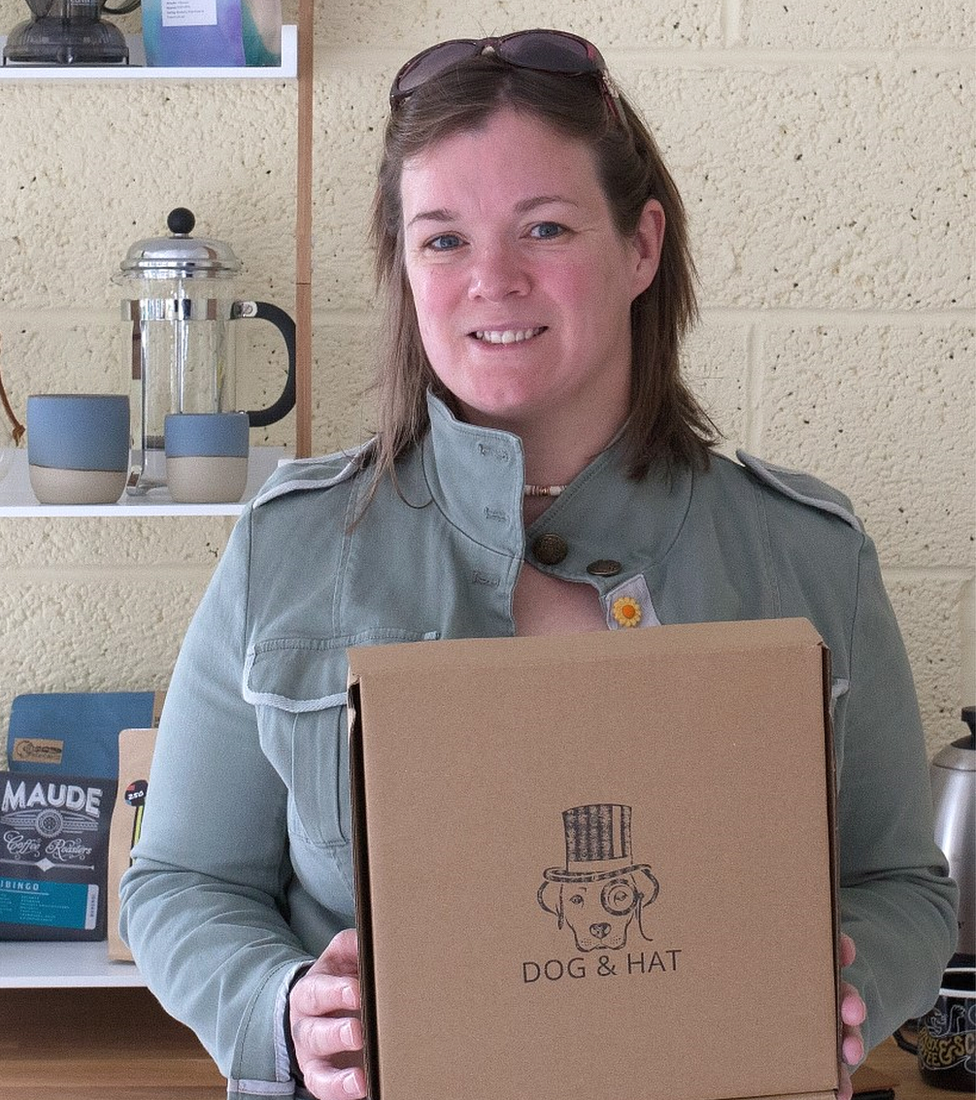
Su Morgan used to work in IT and software and now runs the family coffee company from her home in York

Dani McFerran from Belfast had run her own graphic design company for eight years, but her work dried up when the pandemic hit.
"Having that fire in my belly, I looked at other ventures that might be workable in lockdown, so I started The Belfast Coffee Company with three friends," she says.
None of them had experience in the world of coffee, but they'd always dreamed of starting a business together.
The product launched in October and is stocked by eight retailers in Northern Ireland. Dani says they've sold 5,000 bags of coffee so far, posting some as far afield as the US and Australia, after customers found them on social media.
In the meantime, her graphic design business picked up again, so it's a challenge to devote enough time to the growing coffee company, she says. The team draws no profit, as everything is reinvested.
"It seemed a crazy idea and we were surprised at the success," says Dani. "We weren't ready for how big it has become."
Lockdown is a time of business opportunities if you "regroup, rethink and reframe", she says.
Dani McFerrin was surprised by the customers she found
In an increasingly crowded market, other coffee subscription services have tried to stand out by offering curated roasts by experts, or promising to minimise the time between roasting and home delivery, to maximise freshness.
For example, Balance Coffee, based in London, promises an ethical supply chain. It has tripled its subscribers in the past three months.
So is this change the "new normal"?
"As we come out of lockdown, some of the shift to at-home drinking will be reversed, with the retail coffee market, including sales from supermarkets, losing some of its temporary sales boost," says Amy Price, senior food and drink analyst at Mintel.
However, she still believes that a fundamental shift has occurred and a greater number of people working from home will sustain the "premiumisation" trend, with "coffee drinkers looking to recreate the coffee shop experience".
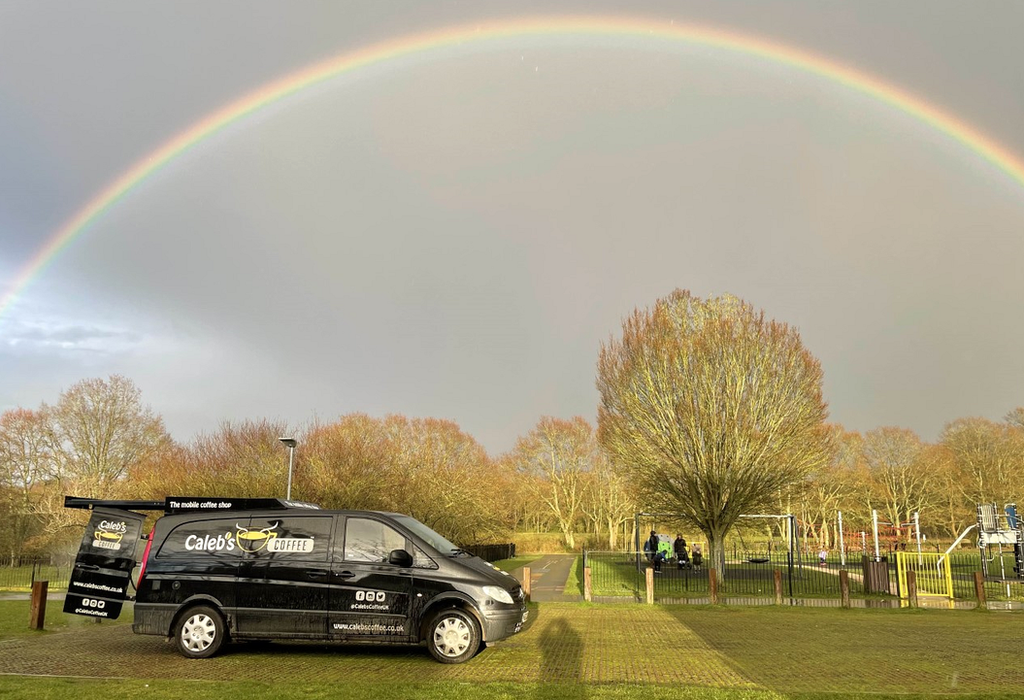
Both coffee vans and cafe chains are hoping for a bright future post-lockdown
The pandemic hasn't necessarily ended our love affair with the branded coffee shop though.
While chains located in busy city centres and transport hubs saw sales drop significantly, there has only been a small amount of actual store closures: around 2%.
While they have had to close for dine-in, many chains offer a click-and-collect takeaway service or home delivery, and have received government support in the form of furlough and business rate relief.
As Covid infections drop and the vaccination programme allows society to open up once more, those chains that have weathered the storm should be in a good position, according to analyst firm Allegra, who estimates it will take perhaps three years for the sector to return to pre-pandemic levels.
But some smaller entrepreneurs think the pandemic has taught big businesses an important lesson.
Big chains may benefit from economies of scale, but they were caught short in the pandemic, says Dani McFerrin.
They are locked into big overheads and they can be slow to react when consumer habits change, she adds.
"We aren't going back to how things were, and all businesses need to understand that."
You can follow CEO Secrets producer Dougal Shaw on Twitter: @dougalshawbbc, external
- Published13 November 2020
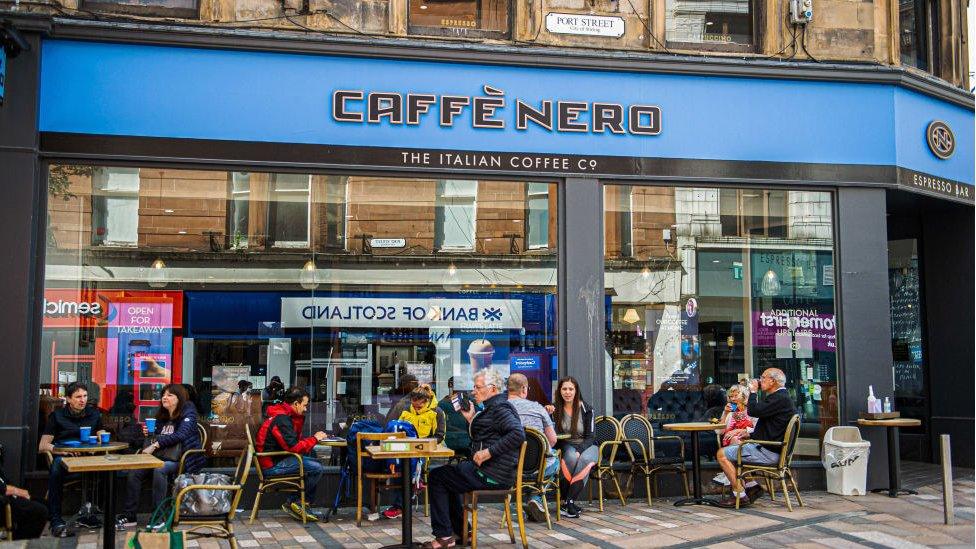
- Published3 September 2020
